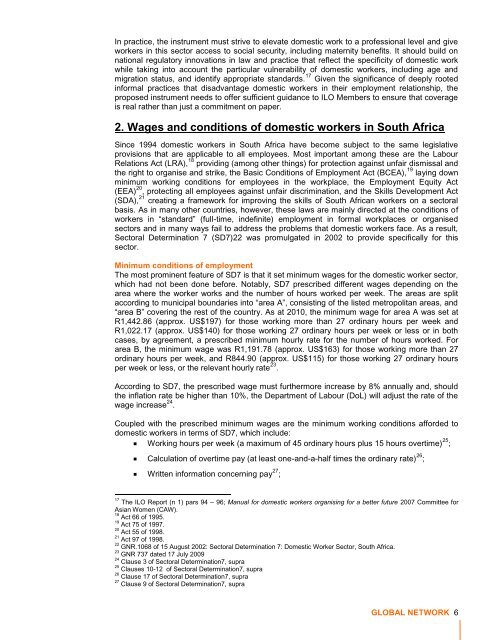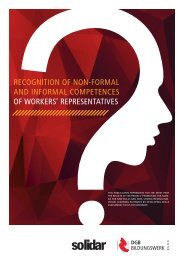domestic workers: decent work for all â south africa - Solidar
domestic workers: decent work for all â south africa - Solidar
domestic workers: decent work for all â south africa - Solidar
Create successful ePaper yourself
Turn your PDF publications into a flip-book with our unique Google optimized e-Paper software.
In practice, the instrument must strive to elevate <strong>domestic</strong> <strong>work</strong> to a professional level and give<br />
<strong><strong>work</strong>ers</strong> in this sector access to social security, including maternity benefits. It should build on<br />
national regulatory innovations in law and practice that reflect the specificity of <strong>domestic</strong> <strong>work</strong><br />
while taking into account the particular vulnerability of <strong>domestic</strong> <strong><strong>work</strong>ers</strong>, including age and<br />
migration status, and identify appropriate standards. 17 Given the significance of deeply rooted<br />
in<strong>for</strong>mal practices that disadvantage <strong>domestic</strong> <strong><strong>work</strong>ers</strong> in their employment relationship, the<br />
proposed instrument needs to offer sufficient guidance to ILO Members to ensure that coverage<br />
is real rather than just a commitment on paper.<br />
2. Wages and conditions of <strong>domestic</strong> <strong><strong>work</strong>ers</strong> in South Africa<br />
Since 1994 <strong>domestic</strong> <strong><strong>work</strong>ers</strong> in South Africa have become subject to the same legislative<br />
provisions that are applicable to <strong>all</strong> employees. Most important among these are the Labour<br />
Relations Act (LRA), 18 providing (among other things) <strong>for</strong> protection against unfair dismissal and<br />
the right to organise and strike, the Basic Conditions of Employment Act (BCEA), 19 laying down<br />
minimum <strong>work</strong>ing conditions <strong>for</strong> employees in the <strong>work</strong>place, the Employment Equity Act<br />
(EEA) 20 , protecting <strong>all</strong> employees against unfair discrimination, and the Skills Development Act<br />
(SDA), 21 creating a frame<strong>work</strong> <strong>for</strong> improving the skills of South African <strong><strong>work</strong>ers</strong> on a sectoral<br />
basis. As in many other countries, however, these laws are mainly directed at the conditions of<br />
<strong><strong>work</strong>ers</strong> in ―standard‖ (full-time, indefinite) employment in <strong>for</strong>mal <strong>work</strong>places or organised<br />
sectors and in many ways fail to address the problems that <strong>domestic</strong> <strong><strong>work</strong>ers</strong> face. As a result,<br />
Sectoral Determination 7 (SD7)22 was promulgated in 2002 to provide specific<strong>all</strong>y <strong>for</strong> this<br />
sector.<br />
Minimum conditions of employment<br />
The most prominent feature of SD7 is that it set minimum wages <strong>for</strong> the <strong>domestic</strong> <strong>work</strong>er sector,<br />
which had not been done be<strong>for</strong>e. Notably, SD7 prescribed different wages depending on the<br />
area where the <strong>work</strong>er <strong>work</strong>s and the number of hours <strong>work</strong>ed per week. The areas are split<br />
according to municipal boundaries into ―area A‖, consisting of the listed metropolitan areas, and<br />
―area B‖ covering the rest of the country. As at 2010, the minimum wage <strong>for</strong> area A was set at<br />
R1,442.86 (approx. US$197) <strong>for</strong> those <strong>work</strong>ing more than 27 ordinary hours per week and<br />
R1,022.17 (approx. US$140) <strong>for</strong> those <strong>work</strong>ing 27 ordinary hours per week or less or in both<br />
cases, by agreement, a prescribed minimum hourly rate <strong>for</strong> the number of hours <strong>work</strong>ed. For<br />
area B, the minimum wage was R1,191.78 (approx. US$163) <strong>for</strong> those <strong>work</strong>ing more than 27<br />
ordinary hours per week, and R844.90 (approx. US$115) <strong>for</strong> those <strong>work</strong>ing 27 ordinary hours<br />
per week or less, or the relevant hourly rate 23 .<br />
According to SD7, the prescribed wage must furthermore increase by 8% annu<strong>all</strong>y and, should<br />
the inflation rate be higher than 10%, the Department of Labour (DoL) will adjust the rate of the<br />
wage increase 24 .<br />
Coupled with the prescribed minimum wages are the minimum <strong>work</strong>ing conditions af<strong>for</strong>ded to<br />
<strong>domestic</strong> <strong><strong>work</strong>ers</strong> in terms of SD7, which include:<br />
• Working hours per week (a maximum of 45 ordinary hours plus 15 hours overtime) 25 ;<br />
• Calculation of overtime pay (at least one-and-a-half times the ordinary rate) 26 ;<br />
• Written in<strong>for</strong>mation concerning pay 27 ;<br />
17 The ILO Report (n 1) pars 94 – 96; Manual <strong>for</strong> <strong>domestic</strong> <strong><strong>work</strong>ers</strong> organising <strong>for</strong> a better future 2007 Committee <strong>for</strong><br />
Asian Women (CAW).<br />
18 Act 66 of 1995.<br />
19 Act 75 of 1997.<br />
20 Act 55 of 1998.<br />
21 Act 97 of 1998.<br />
22 GNR.1068 of 15 August 2002: Sectoral Determination 7: Domestic Worker Sector, South Africa.<br />
23 GNR 737 dated 17 July 2009<br />
24 Clause 3 of Sectoral Determination7, supra<br />
25 Clauses 10-12 of Sectoral Determination7, supra<br />
26 Clause 17 of Sectoral Determination7, supra<br />
27 Clause 9 of Sectoral Determination7, supra<br />
GLOBAL NETWORK 6
















